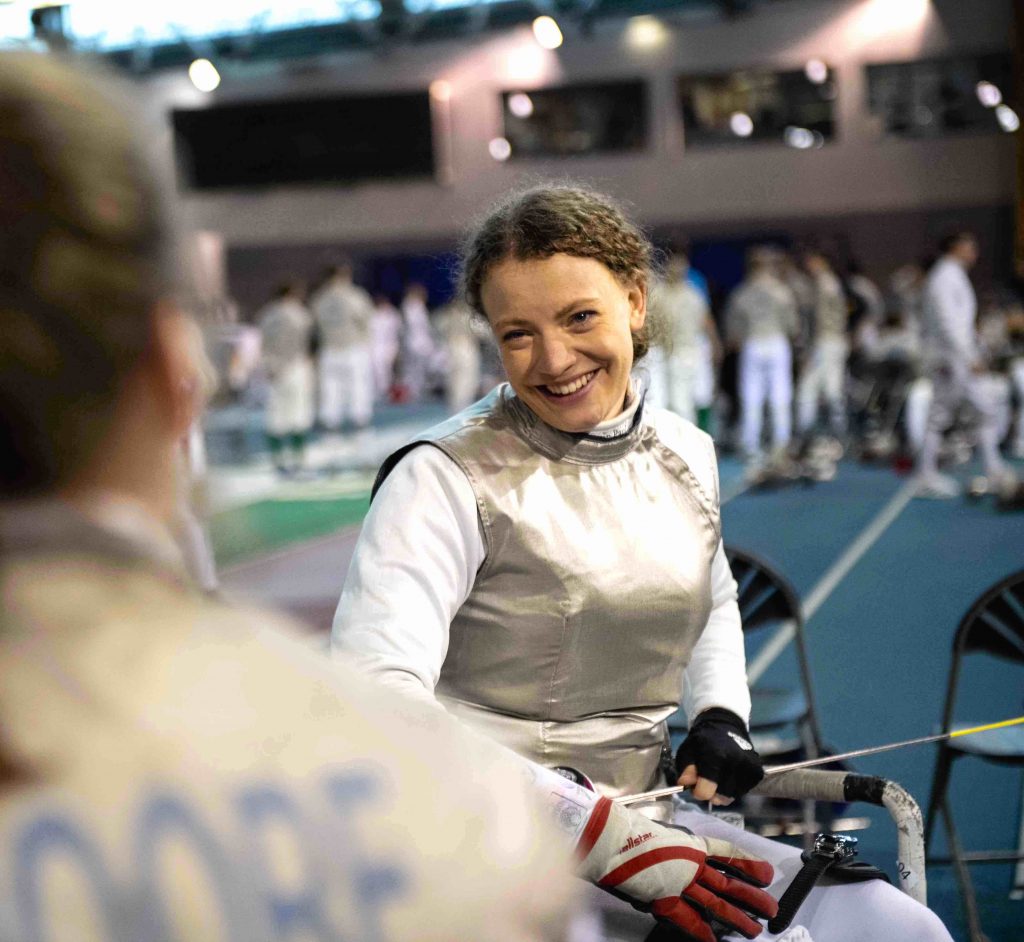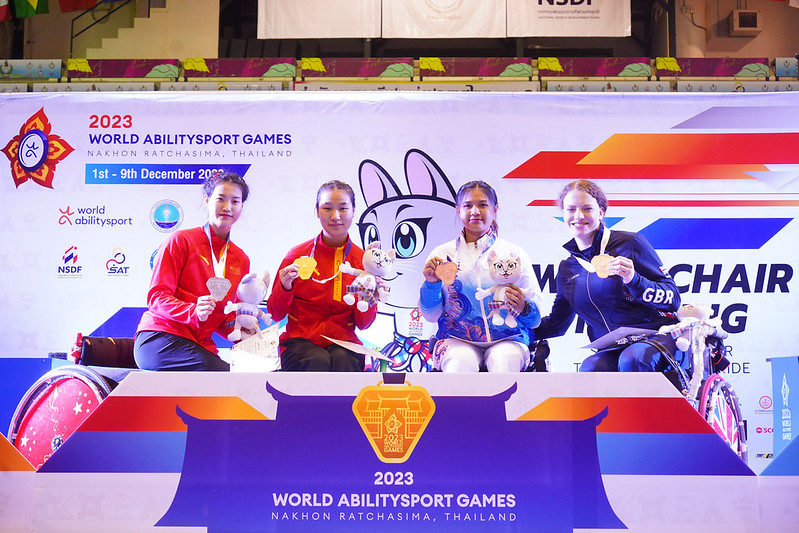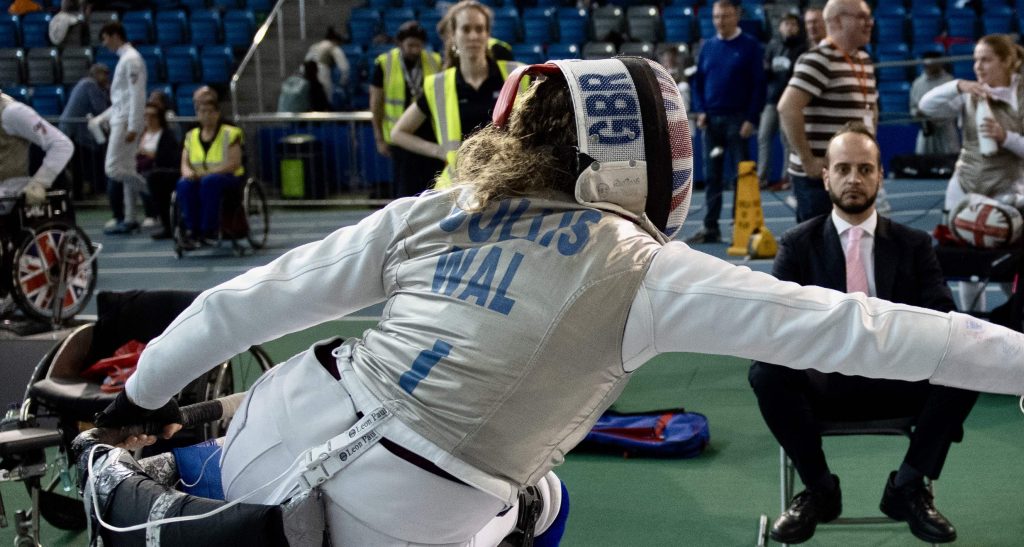


Gemma Collis is coming to the Cardiff Wheelchair Fencing World Cup with a Welsh spirit that has been nurtured both at home and abroad.
Most recently she returned from the Thailand World Cup re-energised after taking bronze in the women’s sabre and epee ‘A’ competitions. But the medals are simply symbolic of her alchemist’s ability to generate valuable opportunities.
“In Thailand, I made two podiums and got some big wins against some of the best fencers in the world to get there. At times I produced my very best fencing and I know what I need to work on as we build up to Paris 2024. I’m super-excited to put in the work ahead of the Cardiff World Cup,” she said.
It is roughly eleven years since Gemma was practising basketball by herself, in her wheelchair, at Durham University where she had only just started studying for her law degree. A man walked up to her and started speaking in a thick Hungarian accent, asking her if she would like to try wheelchair fencing. It was Laszlo Jakab, the then wheelchair fencing head coach for GB.
Gemma only knew one thing about the discipline of wheelchair fencing – that, unlike the sport she was already doing where she was sprinting up and down the court, the wheelchairs were fixed. It would be boring, too slow. But a little later, Gemma thought, ‘What have I got to lose?’. She took another look at Laszlo’s business card and went down to the fencing salle the following week.
“The attitude I had gained from getting a disability in the first place was all about focussing on what you can do and not what you can’t. I sat in the chair, sword in hand. It was so fast! I could tell it was a sport about outwitting the opponent, laying traps. I loved the speed of it, the aggression and how highly-competitive it is. I got the bug for it immediately.”
The transformation from a young fresher into a serious-minded sportsperson who gave up drinking and going out, who started to fence every single day, was made almost instantaneously. “I entered the national championships about a month later and came about fifth. Three months later, I finished as the top-ranked British woman at my first Senior World Cup.” she said.
“We didn’t tell anyone else, but Laszlo and I had what we called our secret dream – to earn a place in the women’s team for London 2012. I really had to play catch-up; there were a lot of fencers ahead of me in the queue for the Paralympics, so Laszlo told me that I just had to go out and win the final domestic event prior to selection to prove that I deserved a place.”
Gemma’s wheelchair broke the day before that final event. As she slept in her hotel bed, Gemma’s dad stayed up until 2am trying to make the least possible noise as he used an electric drill to mend it. The chair was repaired; Gemma went to work and won the competition – and, with it, selection for the London 2012 Paralympics. Approximately ten months after picking up a fencing weapon for the first time, Gemma competed on the Paralympic pistes, where her and her women’s epee team-mates made the quarter-final stages.
“It was after the Paralympics that Laszlo said ‘ok. Now I’m going to teach you how to actually fence rather than just fight!’”

Gemma has certainly mastered her sport and is currently on course to compete at her fourth Paralympics. The Cardiff World Cup tournament will be an important milestone in her journey – not simply because it is a Paris 2024 qualifying event, but also because Gemma is one-part Welsh.
“My maternal grandmother is from the Rhymney Valley and very proud of her Welsh heritage. So am I of mine. It was a great way of connecting myself to a sense of identity when I played wheelchair basketball for Wales. The Welsh have been so supportive of me and taken me under their wing, so to speak. They’ve claimed me as one of their own.”
In the summer of 2023, Gemma proudly sported her Welsh kit to compete at the National Championships in Swansea. The Cardiff World Cup – as a significant, global competitive event – is something which she has not experienced on home turf since London 2012, when the ground shook whenever she scored a hit.
“I am so excited to compete in Cardiff, having competed, and won gold for Wales, at the Commonwealth Fencing Championships in 2022. Never have I been made to feel more part of a team than during that week. I had a whole Welsh cheer-squad follow me around the room throughout – and they went crazy for every single point I won. They were so loud; it made such a difference to me.”
Gemma understands the power of heritage when it elaborates into legacy. She knows that if she medals at Paris, she will be the first female GB wheelchair fencer to have done so since 1988. She understands that Cardiff alone will be a launchpad for more homegrown interest in the sport and will spread a sense of ‘see it; be it’ to those who might be experiencing inequity of opportunity and access. “Sport means being part of a community and group of people that feel like family. It is a sense of belonging extended as far as it can reach. I seldom feel demotivated at the prospect of going training; more that I cannot wait to get into the salle.”

Inspired by those who have blazed the trail before her, Gemma herself has been credited with trailblazing for others. A diagnosis of Complex Regional Pain Syndrome (CPRS) in her teens changed Gemma’s path; meaning that she had to develop the ability to map out her new routes.
There is no such thing as easy in this space. CPRS is a progressive nervous system disorder and is poorly understood as it does not manifest in any clinical scan. It strikes and creeps with a random cruelty, leaving those with it in agony. Prior to acquiring CPRS, Gemma had been on every school sports team going, had reached national level in figure skating, represented her county in hockey and athletics, as well as holding the county triple-jump title. Almost overnight, her life changed.
“Excruciating pain is my normal. My baseline pain threshold is someone’s else’s ‘ten-plus’. I did say ‘why me?’. I did hanker after the past and tried to find a cure so I could be me again. I had appointment after appointment; treatment after treatment. At my very last one, I woke up and cried. I held my dad’s hand and I told him that I just couldn’t do this anymore. That’s when I made the decision not to keep chasing what I had been or the life I’d had.”
Gemma started to volunteer at sports competitions. One time, at the world wheelchair basketball championships, she was on a bit of down-time, flicking through a tournament brochure. She spotted that a member of the Australian team also had CPRS. That was the moment that changed Gemma’s thinking. Her journey in turn helped a fellow fencer in the Netherlands to navigate their own disability. Now Elke Lale van Achterberg – who has become ‘like family’ to Gemma – competes internationally on the circuit for Turkey.
Gemma describes how being in a room full of hugely competitive people – all of whom have come to fencing with an experience of congenital or acquired disability – gives rise to an incomparable sense of bond and shared understanding. It proved to be an important context when Gemma decided to have her affected leg amputated to try and secure some relief from her relentless condition.
“Amputation was the right decision and crucially my quality of life is better. Still, it has been light years harder than what I thought it was going to be. There’s no dream outcome; I have the same pain levels and a few kids have screamed when they’ve seen my stump. Not everyone is completely accepting, and there are certainly challenges and at times some discrimination still.”
“But within fencing, that’s totally different. In wheelchair fencing, everyone has a similar lived experience. And the standing fencers who train with me at the salle don’t care that I have a disability. From a sports angle, I can do everything they can do – plus I can beat them!”
Gemma’s competition preparation speaks volumes on the person she has become through fencing. On a typical morning before a tournament, Gemma will listen to the song I’ll Make a Man Out of You from Mulan and will watch Cool Runnings – the film of perseverance against the odds, seizing second chances and developing self-worth.
“My rituals are just that; they’re not superstitions but listening to music means I can have a little sing and a dance; watching the movie gives me inspiration to be the best and truest version of me. Just like the Jamaican bobsled team make the decision not to try and be like the Swiss team and ‘bobsleigh Jamaican’, I am resolved to do Gemma-like things. I go to the mirror and tell myself that my opponents that day need to worry about me, not the other way round. Enjoyment is an activity; I’ve realised you can actively choose to enjoy yourself whatever situation you’re in.”
Celebration works both ways and Gemma has been hailed for her achievements, taking her place in the pantheon of twenty other Welsh athletes who participated in Tokyo.
Key to how such achievements materialise is the Disability Sport Wales mantra of ‘influence, include, inspire, in-sport’. Welsh ambition, creativity and resourcefulness combine to foster environments for individuals to learn, grow and develop into athletes within their best-fit discipline and have the best possible chance of success – whether that’s participation in their community or at World, Paralympic and Commonwealth level.
It is a future-facing philosophy Gemma holds dear. She talks about how “being successful is all about knowing that you’ve given something your very best. I love challenging myself to be a bit better each day, and to turn every obstacle into an opportunity. I’ve learnt that the most important thing in any situation is to try and see difficulties as hurdles to get over or around, rather than barriers that are stopping you”. Her words remind us that the highest appreciation of life lies not in what we say, but in how we live.
Siân Hughes Pollitt

Sign up to receive regular highlights from the exciting world of fencing - celebrating the best of our unique and inspiring community